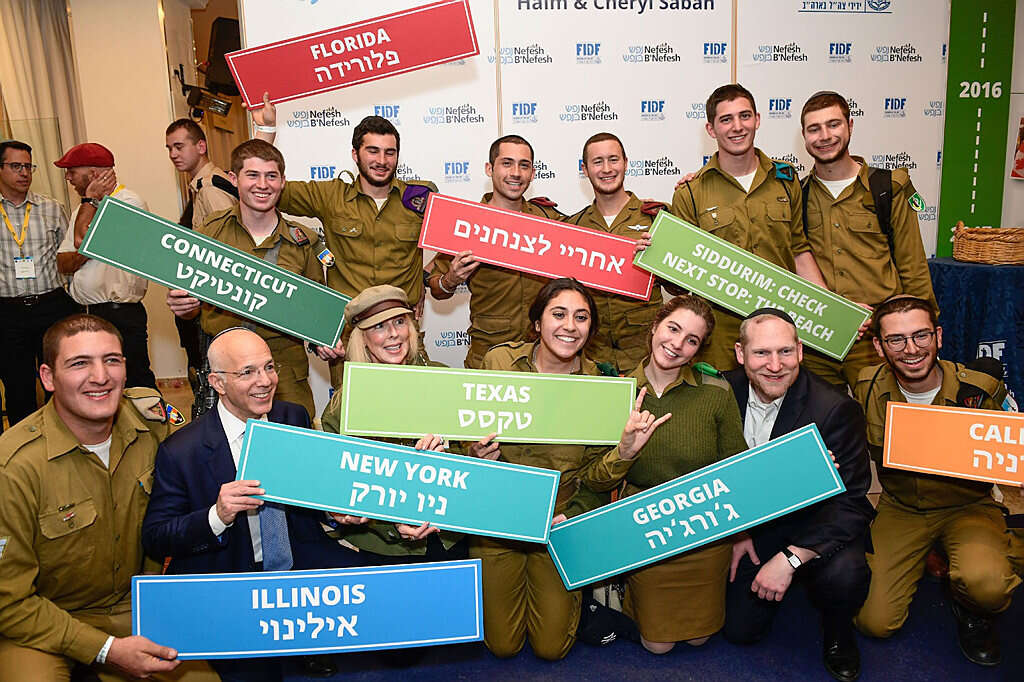Every day IDF soldiers risk their lives to serve and protect Israel and the Jewish people. Thousands of these men and women are lone soldiers, individuals who chose to leave the comfort of their homes and families to serve the Jewish state. Friends of Israel Defense Forces works, among other things, to address their educational, financial, and emotional needs and provide them with a home away from home.
Follow Israel Hayom on Facebook and Twitter
Rabbi Steven Weil is the National Director and Chief Executive Officer of FIDF. He took over the organization following an 11-year tenure at the Orthodox Union.
Q: What formed your relationship with Israel and the IDF?
"I am the first generation in my family to grow up in the US. My family and I were the only Jews in a 60-mile radius of Upstate New York, which gives you a different perspective on life.
"As a kid, I knew I was different. I especially felt the distinction when as children, we would scuffle, and I would suddenly be called 'a dirty Jew.'
"When I was a teenager, my father, who was an only child and part of his family perished in the Holocaust, asked me to get involved with Israel, to be part of the Zionist dream. He wanted the Christian world to appreciate the Jewish people. I was raised on these values. We always heard that we have Israel, that we have a family."
Q: What are some of your childhood memories with respect Israel?
"When I was 11, we had a TV with three channels, and I watched [Prime Minister] Menachem Begin's speak. I remember he addressed anti-Israel Illinois senator Charles Percy and shouted intensely, 'Mr. Percy, the Jewish people made an oath to God, they did not make an out to you.' That speech gives me goosebumps to this day. At that moment, I was so proud to be a Jew, when Begin stood up for the Jewish people. In the end, it is little stories like this that made all the difference for me."
Q: You grew up on the legacy of the 1967 Six-Day War, the 1973 Yom Kippur War, and the Zionist dream, which is not the case for current young American Jews. Does it ever make you worried?
"True, there is a difference between those who experienced the tangible doubt over the continued existence of the state and those who did not. Today's generation doesn't understand the threats to Israel. The average Jew living in the United States is not into this. American newspapers have a page and a half on foreign news, at most, with the exception of the Wall Street Journal and The New York Times. The average US newspaper reflects the mentality of the average American.
"There are Congress members who have never thought of leaving the country. The average Jew in the United States busies himself with Kim Kardashian's divorce, the Oscars, the Superbowl – not the Persian Gulf, Iran, China, or Russia.
"During the coronavirus, people have become more serious, true, but they still don't think internationally. Israelis, on the other hand, look at this from a global perspective."
Q: It seems that the younger generation is not as interested in supporting an organization affiliated with the IDF.
"This challenge is real and it worries me. Let's start with the good news: the average young American that leaves the US to come [to Israel] on Birthright never celebrated his bar mitzvah, nor do they have a Jewish name. Our polls show that the second-most important experience they had was spending Shabbat in Jerusalem and visiting the Western Wall and the Jewish quarter.
"The most important thing for them was the connection they formed with Israelis, who were in the army at the time. This is amazing because, despite their different backgrounds, there was a connection between them. This is how arose an entire generation of people who have had positive interactions with Israel, regardless of their views on the army or politics."

Q: And what's the bad news?
"Unlike the Orthodox [Jews], who succeed in preserving Judaism and are interested in and dream of Israel, most American Jews have a very low birth rate, 1.3 children on average per woman. In Israel, the number is 3.1. [Jewish population in] Israel has grown, [in] the US is shrinking, and it's challenging. Let's also not forget that the average American Jew under the age of 50 is not so enthusiastic about the IDF or Israel. The situation is quite pessimistic – that is until they visit Israel.
"We try to show them that the IDF is much more than 'just an army.' It is a national service in its broadest sense. It is the great uniter of the people of Israel and Judaism. It is the springboard of creating values, of establishing a start-up nation.
"All these essential elements are shaped via the army experience. Add to that the FIDF's efforts to connect young people to Israel through the video library we created, social media, by being involved in different fields, and in such a way, to improve the situation."
Q: Donations to the FIDF droped in 2019. I assume the situation was not much better in 2020. How do you fundraise for a cause that is often considered controversial?
"In 2020, donations kept decreasing. There's been a slight increase in 2021. Raising funds requires a lot of connections. People donate money if they feel they are a part of something bigger, something that makes a difference in the world.
"Language also makes a difference, how we address people. I will not speak the same way to a person who lived here in 1967 or 1973 and someone young or an ultra-Orthodox Jew. The IDF is involved in everything - education, welfare, security, the future of Israel, health - and yet, every donor speaks from a different perspective."
Q: How many donors does the organization have?
"In 2014, during Operation Protective Edge, we had 58,000 donors. It has decreased every since, and in 2020 we had 22,000 donors. It's a huge drop. Our goal is to bring the number of donors back up in the next 6-7 years. We do this through the means at our disposal - social media, fieldwork, and more."
Q: Do you know why the number has gone down?
"The pandemic is disruptive and does not make fundraising easy. But we are hopeful. If you look at the research from the Pew Research Center, socio-economically speaking, the most affluent group in the United States is what is referred to in Israel as national religious, and they are also one of the most giving groups. They try to donate, they want to be involved, and they have a longing and love for Israel.
"Progressive liberals are a kind of a 'block' in the Jewish-American group, and if they perceive us as a military organization, that would be a big obstacle. However, if they think of us as an organization that provides people with a second chance in life, educational opportunities, a group that unites Jews of different backgrounds, that is already a different language, one that they believe in. And this is what the army does the best. Of course, our goal is not purely a financial one, and what we consider important is connecting US Jews to Israel."
Q: What about Zionists who tell you that you shouldn't take money from abroad?
"My response to such cynical voices is: look at the big picture. American Jews need you, the people of Israel, more than you need them. We are a strong Jewish nation when we are connected to our heart and soul, and Israel is our heart and soul."
Q: What are some of the challenges the organization deals with now?
"We ran into problems as a result of the coronavirus, because many of the soldiers spent lockdowns on their bases, for example. There are also lone soldiers who don't have anyone who would do laundry for them or prepare them a hot meal. We are trying to help them through the Manpower Directorate, Nefesh B'Nefesh and other institutions in order to provide them the services they need. In the last two weeks, we met with 60-70 lone soldiers, some Israeli and some from around the world. They feel that the army is their family, and I think it's wonderful."

Q: What is FIDF's impact on Israel in the long run?
"We are a nonprofit organization that currently has 24 branches, and was established in 1981 by Holocaust survivors who immigrated to the United States in order to strengthen the State of Israel through supporting its soldiers. In 2020 alone, the organization helped more than 100,000 discharged soldiers.
"As for your question, what we provide is substantial educational solutions that create a transformation in society. This is why we have the IMPACT scholarships, why we support the IDF's fund for discharged soldiers, and the Michve Alon and Havat HaShomer [bases] that train at-risk soldiers or minorities.
"These programs and places allow [the soldiers,] among other things, to complete their studies and give them an academic degree. So that after three years of military service, the soldiers and commanders can continue to contribute to the state for another 60 years.
"Don't forget that in the US, most citizens do not do the army. Whoever does, his higher education gets paid for. Israel cannot do that because 14.9% of its GDP goes to the army. For me, it's an unbelievable number, unreal. It is a miracle that Israel has survived economically. Germany spends 2.2% of its GDP on the army, Hungary 1.1%, and England 3.6%."
Q: How does the Biden administration impact US-Israel relations?
"It's a problematic question for me. We are a non-political organization and we make sure to let our sponsors know that."
Q: And how are the Abraham Accords affecting your work?
"At FIDF, we help young Israelis from the periphery go into intelligence corps, like Unit 8200. In the future, it enables them to get a higher education and help Israel economically. The United Arab Emirates and Bahrain, for example, see Israel's amazing ability for social transformation in different fields, and it solidifies the bond with them. They understand how much power Israel has."
Q: You've also met with IDF Chief of Staff Aviv Kochavi. What did you speak about?
"I can only say that he is kind and eloquent, and he cares deeply about Jews in the Diaspora. He is wonderful to work with."
Q: I presume you also spoke about the Iranian threat.
"Without going into details, I am very worried about Iran. And the US is not immune to security threats either. You should know, I pray three times a day and Iran is the first thing I talk about with God. When they call for Israel's destruction, they mean it.
"Unfortunately, Iran knows that after the wars in Afghanistan and Iraq, as well as in Europe, the United States fears war. I think there is too little deterrence and that creates a world that is scary to live in."
Subscribe to Israel Hayom's daily newsletter and never miss our top stories!




